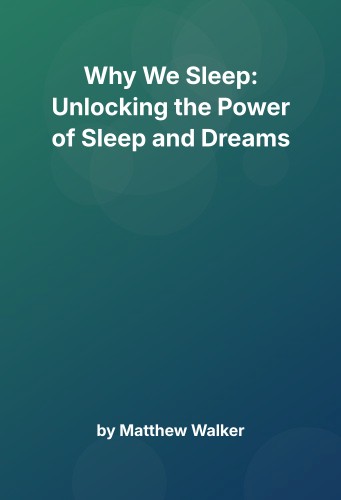Introduction
“Why We Sleep: Unlocking the Power of Sleep and Dreams” by Matthew Walker is a profound examination of the critical role sleep plays in our lives. Walker, a renowned neuroscientist and sleep expert, delves into the myriad ways sleep influences our health, cognitive function, and overall well-being. Through compelling research and practical advice, the book underscores sleep as a fundamental pillar of human health, akin to diet and exercise.
This enhanced summary will expand on Walker’s insights, drawing comparisons with other notable works in the field, and provide a detailed analysis of the book’s core frameworks and themes.
Core Frameworks and Concepts
Walker’s exploration of sleep is structured around several key frameworks that elucidate the complex mechanisms and benefits of sleep. These frameworks are critical for understanding how sleep affects various aspects of human life.
The Science of Sleep Cycles
Walker explains the architecture of sleep by breaking it down into cycles, each containing stages of REM (Rapid Eye Movement) and non-REM sleep. Non-REM sleep is further divided into stages 1 through 3, with stage 3 being the deepest and most restorative. REM sleep, on the other hand, is associated with vivid dreaming and plays a crucial role in emotional regulation and memory consolidation.
Example: Consider REM sleep as the brain’s “emotional first aid” and memory organizer. Just as tidying up a cluttered room can make it more functional, REM sleep tidies our emotional experiences and memories, making them more accessible and meaningful.
The Importance of Circadian Rhythms
Walker emphasizes the significance of circadian rhythms—our internal biological clocks that regulate sleep-wake cycles. These rhythms are influenced by environmental cues such as light and temperature. Disrupting these cycles, as seen in shift work or excessive screen time, can lead to sleep disorders and health issues.
Comparison: In “The Circadian Code” by Satchin Panda, similar themes are explored, highlighting how aligning our activities with our circadian rhythms can enhance physical and mental performance. Both authors underscore the detrimental effects of circadian disruption on metabolism and cognitive function.
Sleep and Its Impact on Health
Walker argues that sleep is foundational for physical and mental health. He presents evidence linking sleep deprivation to a host of health problems, including obesity, diabetes, cardiovascular disease, and even cancer. Sleep is also vital for immune function, with sleep deprivation leading to increased susceptibility to illnesses.
Analogy: Think of sleep as the body’s nightly maintenance schedule. Just as a car requires regular servicing to operate efficiently, our bodies need sleep to repair and regenerate.
The Role of Sleep in Learning and Memory
Sleep enhances learning and memory by solidifying new information. Walker describes sleep as an “off-line” period where the brain processes and stores information gathered during the day. This concept aligns with insights from “Make It Stick” by Peter Brown, which emphasizes the role of retrieval practice in strengthening memory, complemented by sleep’s consolidation process.
Sleep Hygiene and Practical Advice
Walker provides actionable advice for improving sleep quality, stressing the importance of consistent sleep schedules, a sleep-conducive environment, and avoiding stimulants like caffeine and electronics before bed. This advice is mirrored in “The Sleep Revolution” by Arianna Huffington, which advocates for a cultural shift in how we value sleep and offers tips for achieving restful slumber.
Key Themes
Walker’s book is rich with themes that highlight the multifaceted nature of sleep and its profound impact on our lives.
1. Sleep as a Pillar of Health
Sleep is not merely rest but a critical component of health. Walker positions sleep alongside diet and exercise as fundamental to well-being. The book presents compelling evidence that sufficient sleep can enhance athletic performance, bolster immune function, and extend lifespan.
2. The Cognitive Benefits of Sleep
Sleep is integral to cognitive processes such as learning, memory, creativity, and problem-solving. Walker illustrates how sleep deprivation impairs these functions, drawing parallels to “Thinking, Fast and Slow” by Daniel Kahneman, where system 1 and system 2 thinking are affected by lack of sleep. The book emphasizes the necessity of sleep for optimal cognitive performance.
3. The Emotional Balance Provided by Sleep
Sleep, particularly REM sleep, is crucial for emotional regulation. Dreams serve as a mechanism for processing emotions, reducing stress, and fostering psychological resilience. Walker’s findings resonate with the emotional intelligence framework discussed in “Emotional Intelligence” by Daniel Goleman, which underscores the role of sleep in maintaining emotional health.
4. Societal Implications of Sleep Deprivation
Walker critiques modern society’s disregard for sleep, linking sleep deprivation to increased accidents, workplace errors, and reduced productivity. He calls for a societal reevaluation of sleep’s importance, akin to the cultural shift advocated in “The Sleep Revolution.”
5. The Future of Sleep Science
The book concludes with a look toward the future, highlighting ongoing research and potential advancements in sleep science. Walker envisions a world where sleep is prioritized and integrated into public health policies, echoing the sentiments of health advocacy seen in “The Blue Zones” by Dan Buettner.
Final Reflection
“Why We Sleep” is a clarion call to recognize and restore sleep to its rightful place in our lives. Walker’s synthesis of scientific evidence and practical advice empowers readers to make informed choices about their sleep habits. By comparing Walker’s insights with those from other seminal works, we gain a more comprehensive understanding of sleep’s indispensable role in health and well-being.
In leadership, the parallels between sleep and decision-making processes underscore the necessity of rest for effective judgment and innovation. Design thinking also benefits from sleep, as the creative insights often emerge from the subconscious mind during REM periods.
Ultimately, “Why We Sleep” challenges us to rethink our relationship with sleep and inspires us to cultivate habits that foster physical, mental, and emotional health. By prioritizing sleep, we unlock our full potential and lay the foundation for a healthier, more productive society.

